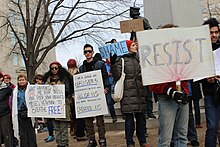The Resistance (American political movement)

The #Resistance (also known as the Resistance) is an American liberal and left-wing political movement that protests the first and second presidencies of Donald Trump.[1][2][3][4][5]
Background
[edit]Commencing on an unknown date shortly after the presidential election in November 2016, it initially included Democrats on Twitter and Facebook before expanding to include independents and Republicans who opposed Trump on various social networking services.[6] Members have been described as prolific in their use of Twitter, especially the #Resist hashtag and, early on, #TheResistance.[5][7] These have been among the most consistent hashtags that have been used in the anti-Trump movement on social media.[8]
Popularity
[edit]Generally, the #Resistance symbolizes solidarity against Donald Trump. Its hashtags have also been used alongside other policy-specific hashtags, targeting marginalized groups such as minorities and women. Though its height of popularity occurred during the days following Trump's first inauguration, it resurfaced during times of political controversy and animosity.[9] For instance, there was a notable spike in usage throughout the week of Trump's response to the Unite the Right rally in Charlottesville, Virginia.[9] Moreover, in the three days following the announcement of the initial Muslim ban in late January, #Resist appeared in over 2.5 million tweets.[10] Several prominent celebrities have used the hashtag to show opposition to Trump, including Shailene Woodley, Zendaya, Sia, Rosie O'Donnell, Cher, Olivia Wilde, and Sophia Bush.[10] The movement also resurged during and after Trump's successful campaign in the 2024 presidential election.[5]
See also
[edit]- Deep state in the United States
- I Am Part of the Resistance Inside the Trump Administration
- Indivisible movement
- Never Trump movement
- Brian and Ed Krassenstein
- 2017 Women's March
References
[edit]- ^ "Wonder who's fighting Trump? Meet the #Resistance". France 24. 2018-05-30. Retrieved 2019-06-28.
- ^ Smith, Mychal Denzel (2019-02-14). "Passive Resistance". The New Republic. ISSN 0028-6583. Retrieved 2019-06-28.
- ^ Vogel, Kenneth (October 7, 2017). "The 'Resistance,' Raising Big Money, Upends Liberal Politics". The New York Times. Retrieved March 18, 2019.
- ^ Seitz-Wald, Alex (January 19, 2018). "The anti-Trump 'Resistance' turns a year old — and grows up". NBC News. Retrieved March 17, 2019.
- ^ a b c Krueger, Katherine (September 30, 2024). "The #Resistance Is Back. Be Afraid". The Nation. Retrieved October 1, 2024.
2017, when a loose coalition of voters, elected officials, and former TV game show contestants joined together with the singular goal of resisting a newly inaugurated president, Donald Trump, whom they viewed as an existential threat to democracy and the republic itself. #TheResistance, as it was known on the website then called Twitter, didn't materialize in time to stop Trump's first election, but it had solidified its place in the culture by the time he took office
- ^ Wenzke, Marissa. "One hashtag is uniting Americans in the fight against Trump". Mashable. Retrieved October 13, 2017.
- ^ Wenzke, Marissa (February 2, 2017). "How #Resist became the rallying cry for fighting back in Trump's America". Mashable. Retrieved March 17, 2019.
- ^ "Google Trends". Google Trends.
- ^ a b "Google Trends". Google Trends. Archived from the original on August 6, 2020. Retrieved October 13, 2017.
- ^ a b Lang, Cady. "50 Celebrities React to Donald Trump's Immigration Order". Time. Retrieved October 13, 2017.
